WordPress sitenizi ilk kurduğunuzda her şeyin mükemmel göründüğünü hatırlıyor musunuz, ta ki URL’nizdeki can sıkıcı /wordpress/ ifadesini fark edene kadar? Biz de o yollardan geçtik. Bu, profesyonel web sitenizin amatör bir proje gibi görünmesine neden olabilecek küçük ayrıntılardan biridir.
URL’nizdeki bu fazladan /wordpress/ sadece estetik bir sorun değildir. Sitenizin SEO’sunu etkileyebilir ve web adresinizi gereksiz yere uzun ve karmaşık hale getirebilir. WPBeginner’da sayısız WordPress kullanıcısına bu sorunda yardımcı olduktan sonra, bunun ne kadar sinir bozucu olabileceğini tam olarak biliyoruz.
Bugün size sitenizin URL’sinden /wordpress/ ‘i kaldırmanın doğru yolunu göstereceğiz. Bu yöntemi yüzlerce web sitesinde test ettik ve doğru yapıldığında her seferinde işe yarıyor. Hadi URL yapınızı bir kez ve herkes için düzeltelim.
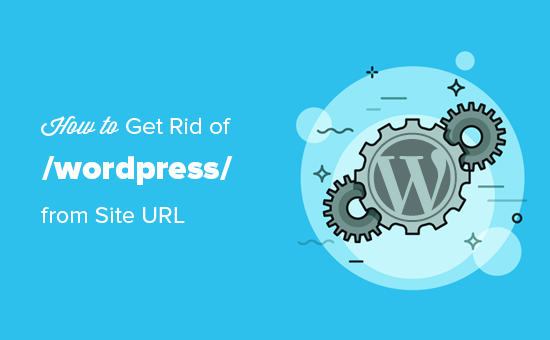
Not: Bu eğitimde gösterilen yöntem diğer alt dizinler için de geçerlidir.
Web Sitemin URL’sinde Neden /wordpress/ Var?
WordPress’in kurulumu oldukça kolaydır ve çoğu WordPress barındırma şirketi, barındırma kontrol panellerinde hızlı WordPress yükleyicileri sunar.
Ancak, WordPress web sitelerini manuel olarak kuran bazı yeni başlayanlar, yanlışlıkla bir alt dizine kurabilirler. Çoğu zaman bu alt dizin ‘wordpress’ olarak adlandırılır.
Bu genellikle kullanıcıların resmi WordPress.org indirmesi içinde buldukları wordpress klasörünü yüklemelerinden kaynaklanır.
Şimdi bunu nasıl kolayca düzeltebileceğinize ve sitenizin URL’sinden /wordpress/ ‘i nasıl kaldırabileceğinize bir göz atalım. Üç yöntemi ele alacağız ve kullanmak istediğinize atlamak için bu bağlantıları kullanabilirsiniz:
Yöntem 1: Yeni Bir WordPress Kurulumu ile Baştan Başlayın
WordPress’i yeni kurduysanız ve web sitenizde hiç içerik yoksa, devam edip baştan başlayabilirsiniz.
WordPress ‘i düzgün bir şekilde yeniden yüklemek için mevcut kurulumu silin ve WordPress yükleme eğitimimizdeki talimatları izleyin.
Web sitenize zaten içerik eklediyseniz, sitenizin URL’sinden /wordpress/ ifadesini kaldırmanın iki kolay yolu vardır. Bunları Yöntem 2 ve 3’te ele alacağız.
Yöntem 2: WordPress Site Adresinizi Değiştirin
Eğer kurulu bir WordPress siteniz varsa, bu yöntem daha kolay ve hızlıdır. Bu yöntemin dezavantajı, resimler gibi medya dosyalarınızın URL’lerinde hala /wordpress/ kullanacak olmasıdır.
Bazı SEO araçları bu medya dosyası URL’lerini ana alan adınızla tutarsız olarak işaretleyebilir ve ziyaretçiler görsellere sağ tıkladıklarında veya incelediklerinde /wordpress/ adresini görmeye devam ederler.
İlk olarak, WordPress yönetici alanınıza giriş yapmanız ve Ayarlar ” Genel bölümüne gitmeniz gerekir. Burada iki farklı URL ayarı göreceksiniz.
‘WordPress Adresi (URL)’ ayarı WordPress’e çekirdek dosyalarınızın nereye yüklendiğini söyler. ‘Site Adresi (URL)’, WordPress’e ziyaretçilerin sitenize erişmek için hangi URL’yi ziyaret etmesi gerektiğini söyler.
‘Site Adresi’ seçeneğini değiştirmeniz ve kök alan adınıza yönlendirmeniz gerekir, örneğin https://www.example.com ve ‘WordPress Adresi’ seçeneğini olduğu gibi bırakın.
Bunu yaptıktan sonra, ayarlarınızı kaydetmek için ‘Değişiklikleri Kaydet’ düğmesine tıklayın.
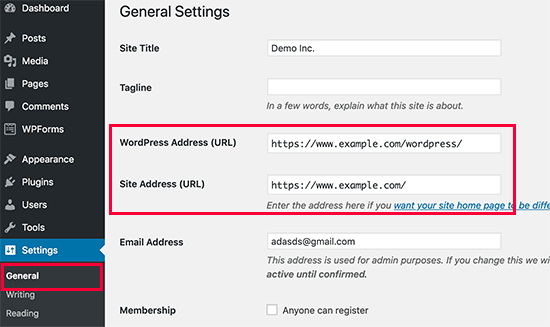
Ardından, bir FTP istemcisi kullanarak web sitenize bağlanmanız gerekir. Oraya vardığınızda, /wordpress/ dizinine gidin ve .htaccess ve index.php dosyalarını bilgisayarınıza indirin.
Eğer .htaccess dosyasını bulamıyorsanız, FTP istemcinizi gizli dosyaları göstermeye zorlamanız gerekebilir. Filezilla kullanıyorsanız, menü çubuğundan Sunucu’ya tıklamanız ve ‘Gizli dosyaları göstermeye zorla’ seçeneğini seçmeniz gerekir.
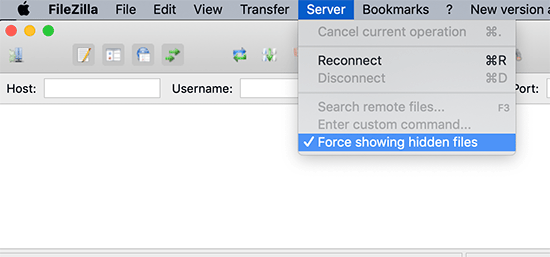
Her iki dosyayı da bilgisayarınıza indirdikten sonra, index.php dosyasını Notepad gibi bir metin düzenleyicide açmanız gerekir. Bu dosyada şuna benzer bir satır bulacaksınız:
1 | require( dirname( __FILE__ ) . '/wp-blog-header.php' ); |
Bu satır, WordPress sitenizi yüklemek için gerekli olan wp-blog-header.php dosyasını yükler.
Şimdi yapmanız gereken, mevcut satırı bununla değiştirerek dosyanın doğru konumunu girmektir:
1 | require( dirname( __FILE__ ) . '/wordpress/wp-blog-header.php' ); |
Değişikliklerinizi kaydedin ve hem index.php hem de .htaccess dosyalarını masaüstü bilgisayarınızdan FTP kullanarak alan adınızın kök dizinine yükleyin.
Kök klasör, içinde ‘wordpress’ klasörü bulunan ana klasördür ve genellikle /www/ veya /public_html/ olarak adlandırılır.
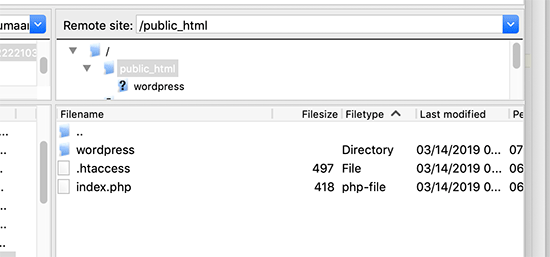
Hepsi bu kadar. Artık kök alan adını kullanarak web sitenizi ziyaret edebilirsiniz ve her şey yolunda gidecektir.
1 | https://example.com |
Ancak, WordPress yöneticinize giriş yapmanız gerekiyorsa, yine de ‘wordpress’ dizini içindeki wp-admin’e şu şekilde gitmeniz gerekecektir:
1 | https://www.example.com/wordpress/wp-admin |
Yöntem 3: WordPress’i Kök Dizine Taşıma
Bu yöntem daha kapsamlıdır ve WordPress sitenizi alt dizinden web sitenizin kök klasörüne kalıcı olarak taşıyacaktır.
Adım 1: Bir Çoğaltıcı Paketi Oluşturun
Öncelikle, web sitenize ücretsiz Duplicator eklentisini yüklemeniz ve etkinleştirmeniz gerekir. Daha fazla ayrıntı için, bir WordPress eklentisinin nasıl kurulacağına ilişkin adım adım kılavuzumuza bakın.
Not: Bu eğitim için Duplicator’ın ücretsiz sürümünü kullanacağız. Ancak, sınırsız yedekleme, zamanlanmış yedekleme, sürükle ve bırak içe aktarma ve daha fazlasını elde etmek için Duplicator Pro ‘ya yükseltebilirsiniz.
Etkinleştirmenin ardından, Duplicator ” Yedekler sayfasını ziyaret etmeniz ve ardından ‘Yeni Oluştur’ düğmesine tıklamanız gerekir.
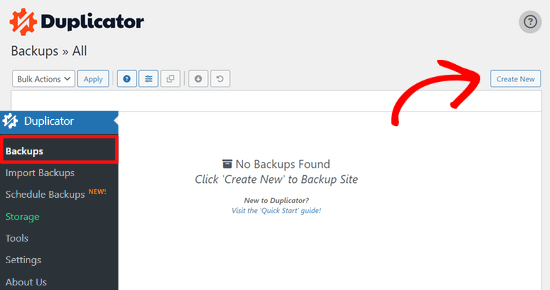
Bu, web sitenizin tamamının bir yükleyici paketini oluşturacak olan Duplicator sihirbazını başlatacaktır.
Yedeklemeniz için bir ad ekleyebilir ve devam etmek için ‘İleri’ düğmesine tıklayabilirsiniz.
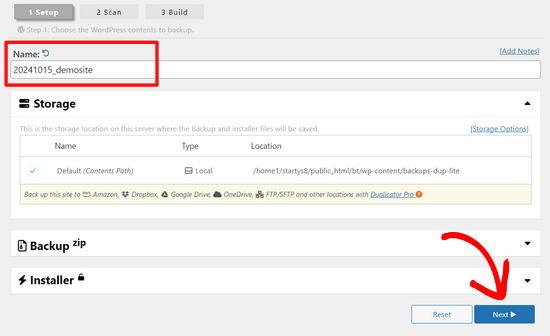
Ardından, eklenti bazı taramalar yapacaktır. Her şey iyi görünüyorsa, alttaki ‘Oluştur’ düğmesine tıklayabilirsiniz.
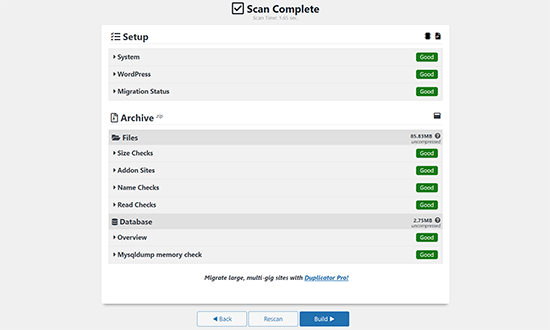
Duplicator şimdi bir paket oluşturacak ve yükleyici komut dosyasıyla birlikte indirmenizi isteyecektir.
Devam edin ve ‘Her İki Dosyayı da İndir’ düğmesine tıklayarak her iki dosyayı da bilgisayarınıza indirin.
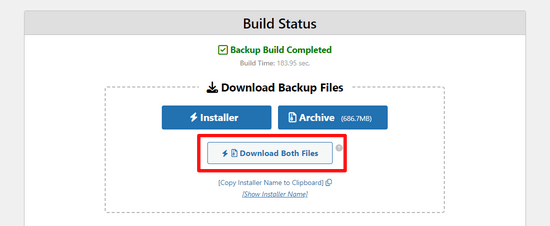
Adım 2: Yeni WordPress Kurulumu için Yeni Bir Veritabanı Oluşturun
Mevcut WordPress veritabanını kullanabilirsiniz, ancak eski veritabanınızın güvende ve değişmemiş olması için yeni bir tane oluşturmak daha iyidir. Bu şekilde, bir şeyler ters giderse çok fazla telaşlanmadan sitenize geri dönebilirsiniz.
Hosting hesabınızın cPanel panosunu ziyaret etmeniz, ‘Veritabanları’ bölümüne ilerlemeniz ve ardından ‘MySQL Veritabanları’ simgesine tıklamanız gerekir. Kontrol paneliniz aşağıdaki ekran görüntüsüne benzer görünebilir, ancak bu, barındırma sağlayıcınıza bağlı olarak değişebilir.

Bundan sonra, veritabanınız için bir ad vermeniz yeterlidir.
Ardından, ‘Veritabanı Oluştur’ düğmesine tıklamalısınız.

cPanel şimdi sizin için yeni bir veritabanı oluşturacaktır. Bundan sonra, ‘MySQL Kullanıcıları’ bölümüne ilerlemeniz gerekir.
Buradan, yeni veritabanı kullanıcınız için bir kullanıcı adı ve şifre sağlamanız ve ‘Kullanıcı Oluştur’ düğmesine tıklamanız gerekir.
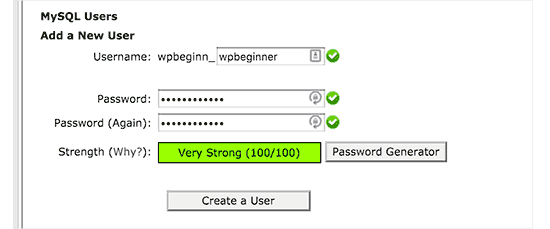
Şimdi, yeni kullanıcıya veritabanı izinleri atamanız gerekir.
‘Veritabanına Kullanıcı Ekle’ bölümüne ilerleyin. ‘Kullanıcı’ alanının yanındaki açılır menüden oluşturduğunuz veritabanı kullanıcısını seçin, ardından veritabanını seçin. Son olarak, ‘Ekle’ düğmesine tıklayın.

Yeni veritabanınız artık yeni WordPress kurulumu için kullanılmaya hazırdır.
Adım 3: Çoğaltıcı Sihirbazını Çalıştırın
Şimdi, Duplicator arşiv paketini ve daha önce indirdiğiniz yükleyici dosyasını web sitenizin kök dizinine yüklemeniz gerekir.
Bu,/wordpress/ klasörünü içeren dizin olacaktır.
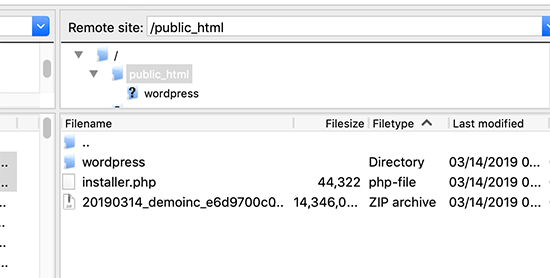
Her iki dosyayı da yükledikten sonra, yükleyici komut dosyasını bir tarayıcı penceresinde açın. Sitenizin kök URL’sini girmeniz ve ardından /installer.php ile öneklemeniz gerekecektir.
1 | https://example.com/installer.php |
Bu, Duplicator yükleyici sihirbazını açacaktır.
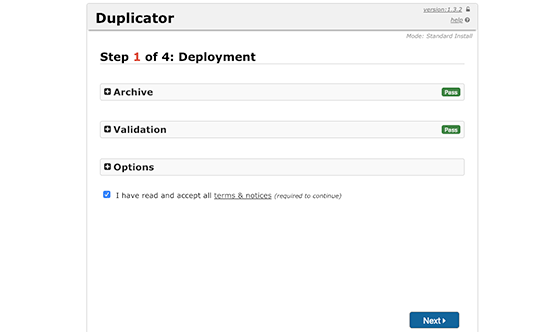
Şartlar ve koşullar kutusunu işaretleyin ve ardından devam etmek için ‘İleri’ düğmesine tıklayın.
Ardından, sizden veritabanı bilgilerini girmenizi isteyecektir. Daha önce 2. adımda oluşturduğumuz veritabanı için bilgileri girin.
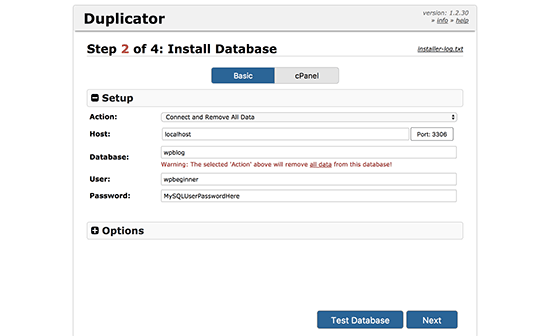
Veritabanı bilgilerini girdikten sonra, devam etmek için ‘İleri’ düğmesine tıklayın. Duplicator şimdi WordPress veritabanı yedeğinizi arşivden yeni veritabanınıza açacaktır.
Ardından, sizden site URL’sini ve yolunu güncellemenizi isteyecektir. Yeni URL ve yolu otomatik olarak algılayacağı için burada bir şey yapmanıza gerek yoktur. Ancak, algılamazsa, ayrıntıları buraya manuel olarak girebilirsiniz.
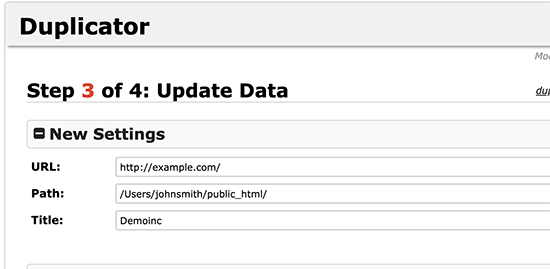
Duplicator şimdi geçişi tamamlayacaktır.
Web sitenize yeni konumdan erişmek için ‘Yönetici Girişi’ düğmesine tıklayabileceksiniz.
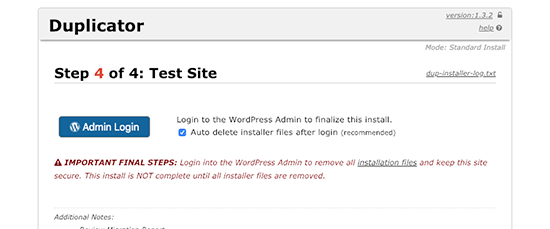
Adım 4: Alt Dizinden Kök Klasöre Yönlendirmeleri Ayarlayın
Tebrikler, WordPress sitenizi alt dizinden kök klasöre başarıyla taşıdınız.
Şimdi, kullanıcılarınızın ve arama motorlarının web sitenizin yeni konumunu bulabilmesi için yönlendirmeleri ayarlamanın zamanı geldi.
Öncelikle, bir FTP istemcisi kullanarak WordPress sitenize bağlanmanız ve ardından eski /wordpress/ klasörünü silmeniz gerekir.
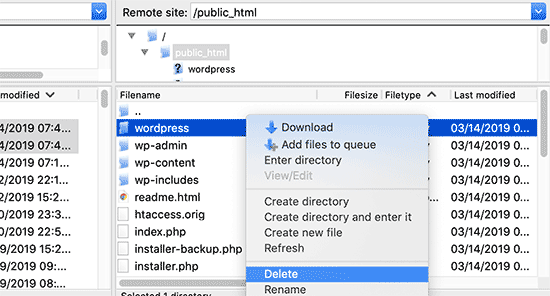
Bundan sonra, WordPress sitenizin yönetici alanına geçin. Web sitenizin kök dizinine taşıdığınız için WordPress yönetici URL’niz şu şekilde olacaktır:
1 | https://example.com/wp-admin |
Şimdi, Yeniden Yönlendirme eklentisini yüklemeniz ve etkinleştirmeniz gerekir. Daha fazla ayrıntı için, bir WordPress eklentisinin nasıl kurulacağına ilişkin adım adım kılavuzumuza bakın.
Etkinleştirmenin ardından Araçlar ” Yeniden Yönlendirme sayfasını ziyaret etmeniz gerekir. Eklenti şimdi size bir kurulum sihirbazı gösterecektir. ‘Kuruluma Devam Et’ ve ardından ‘Kurulumu Bitir’ düğmelerine tıklamanız yeterlidir.
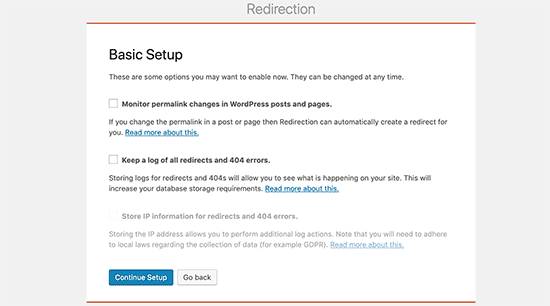
Ardından, ‘Yönlendirmeler’ sekmesine geçmeniz ve yeni yönlendirmenizi eklemeniz gerekir.
Öncelikle, ilk alanın köşesindeki ‘Regex’ kutusunu işaretlemeniz gerekir.
Bundan sonra, ‘Kaynak URL’ alanına gidin ve https://example.com/wordpress/adresini ekleyin .* Ardından, ‘Hedef URL’ alanına gidin ve https://example.com/$1 adresini ekleyin.
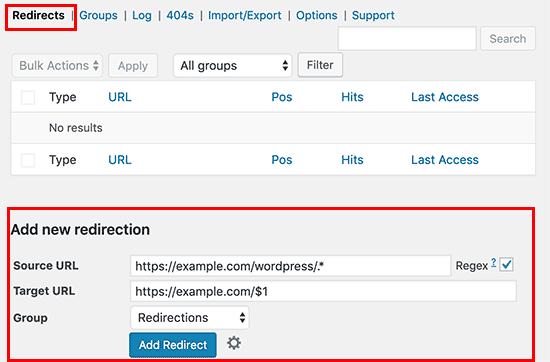
‘example.com’ yerine kendi alan adınızı yazmayı unutmayın. Ardından, değişikliklerinizi kaydetmek için ‘Yönlendirme Ekle’ düğmesine tıkladığınızdan emin olun ve işiniz bitti.
Yazıları ve sayfaları yeniden yönlendirmek için kullanabileceğiniz bir başka araç da All in One SEO’dur (AIOSEO). WordPress’te tam site yönlendirmelerinin nasıl yapılacağına ilişkin başlangıç kılavuzumuzda /wordpress/ içeren eski URL’leri kullanan ziyaretçileri yeni site konumunuza nasıl yönlendireceğinizi gösteriyoruz.
Ayrıca, kırık bağlantıları yakalamak için 404 hata izlemeyi etkinleştirebilirsiniz, böylece anahtar kelime sıralamalarını kaybetmezsiniz.
Şu andan itibaren, URL’de /wordpress/ ile web sitenize erişmeye çalışan tüm kullanıcılar, yeni kök URL’nizle otomatik olarak doğru gönderilere yönlendirilecektir.
WordPress’te URL’leri Değiştirme Konusunda Uzman Kılavuzları
Umarız bu makale WordPress sitenizin URL’sinden /wordpress/ ‘i nasıl kaldıracağınızı öğrenmenize yardımcı olmuştur. WordPress’te URL’leri değiştirmekle ilgili diğer bazı kılavuzları da görmek isteyebilirsiniz:
- WordPress Site URL’lerinizi Nasıl Değiştirirsiniz (Adım Adım)
- WordPress Sitenizi Taşırken URL’leri Kolayca Güncelleme
- WordPress URL’lerinden Rakamlar Nasıl Kaldırılır
- WordPress URL’lerinden Tarih Nasıl Kaldırılır
- WordPress URL’lerinden v=XXXX Dizesi Nasıl Kaldırılır
- WordPress’te Alt Sayfa URL’sinden Üst Slug Nasıl Kaldırılır
- WordPress’te Varsayılan Arama URL Slug’ı Nasıl Değiştirilir?
- WordPress’te Özel Giriş URL’si Nasıl Eklenir (Adım Adım)
- Yeni Başlayanlar İçin Rehber: WordPress Giriş URL’nizi Nasıl Bulursunuz?
- WordPress HTTP’den HTTPS’ye Nasıl Doğru Şekilde Taşınır (Başlangıç Kılavuzu)
If you liked this article, then please subscribe to our YouTube Channel for WordPress video tutorials. You can also find us on Twitter and Facebook.





Brenda
Thank you so much for this tutorial! So helpful.
I followed step #2 and all the pages on my site work now without the /wordpress in the URL, EXCEPT for the homepage. I updated the Site URL in Settings > General, but for some reason the homepage still redirects from mysite.com to mysite.com/wordpress.
Any idea why this might be happening? Thanks in advance!
WPBeginner Support
From the sound of the issue, we would recommend checking your index.php and htaccess are both in the correct folder for a likely reason.
Admin
Brenda
Thanks so much for your response. Figured out the issue!
WPBeginner Support
Glad to hear!
Adrian
Not sure if this related, on initial set up should you you use the www dot …. com or just your sitename dot… com
WPBeginner Support
That is a different situation that we cover in our guide below. WWW vs non-WWW is personal preference:
https://www.wpbeginner.com/beginners-guide/www-vs-non-www-which-is-better-for-wordpress-seo/
Admin
Lilly Walker
I followed Method 1: Change WordPress Site Address
changed the site address with out /mywpfolder
and downloaded the ht.access and the index file – (they dont match your eg but just added the /mywpfolder etc
and uploaded the htaccess and the index files back to the root directory
BUT
the correct front page came up and then clicked on a link it came up but clicked on a link then and it 404’d.
my guess is that some pages have urls manually put in but how do I search and replace these?
Alice K
Hi!
First, thank you very much!
I followed the second method, and now accessing the admin page works without adding “/wordpress” in the URL.
But when I try to access my website I still have to add “/wordpress” to the URL?!
Can anyone help? Where have I gone wrong?
WPBeginner Support
The site is likely active in the old location, you should should still be able to see your login if you go to yourdomain/wp-login.php
Admin
sginader
Thank you! I’m a WP novice so your step by step instructions was perfect. I do have a question – I followed Method 1 – does the redirect add to the site loading time? I ask because my site takes very long to load. Thank you!
WPBeginner Support
While it adds a small amount to the loading time, it shouldn’t add enough to be noticeable. If this increase in load time was recent then you may want to check with your host to ensure there isn’t something conflicting with the redirect you set up.
Admin
Nkosiyapha
This was very helpful. Thank you very much
WPBeginner Support
You’re welcome
Admin
Rachel
I have a question: if I use method 1, do I have to change all url links of my posts and images? My blog are actually inside a folder and I want to make a redirection to the root domain. It’s not clear…
WPBeginner Support
For the first method, you shouldn’t need to redirect your posts.
Admin
birgit van Munster
Hi, I made the change in the index.pho file as directed and moved the two files to the root directory, but I get this error message:
Parse error: syntax error, unexpected ” );’ (T_ENCAPSED_AND_WHITESPACE) in /data/40/5/47/114/5373603/user/6433782/htdocs/index.php on line 17
I think line 17 is exactly as described in the instructions, please help!
WPBeginner Support
You may want to ensure you copied the code correctly and pasted it on a new line. You may want to take a look at our article here: https://www.wpbeginner.com/beginners-guide/beginners-guide-to-pasting-snippets-from-the-web-into-wordpress/
Admin
Bella
Thank you so much! The guide I was reading didn’t mention the .htaccess part. This guide fixed the error on my site. Great work!
Bart
Hi!
Great tutorial, and my URL now redirects (woohoo!)
However when I go the settings tab and change the site title to the one without /wordpress, the site works fine except for the home page, which gives an error.
What am I missing here…?
TROP ICSU
Hi there!
I have my site hosted on my server. WordPress dir is located in /home/myuser/.
I tried to follow your steps by copying the updated index.php and .htaccess into same dir level where wordpress dir is. But no success.
Can you pl guide? Thank you.
Rachel
If I have a wordpress instance in a subdirectory and I just want to delete it and not move it, can I just delete the folder, or do I need to go through some kind of un-install procedure so it is removed from the database as well?
WPBeginner Support
Hi Rachel,
Yes you can delete it. However, we will still recommend to download it as a backup before deleting it.
Admin
Michael Hayman
Hey, so i had a go at this, and for some reason i am now faced with an HTTP 500 error.
Not sure where i went wrong, but i don’t seem to be able to get it back to normal.
Any ideas would be much appreciated.
I have tried resetting the index.php back to default as well as the .htacess file with no avail.
To make matters more difficult i get the same HTTP 500 message when trying to login to the wordpress admin as well.
Clarisse
Hi Michael,
My folder is called “/wp” instead of “/wordpress”, so probably yours too!
That might be the problem…
Louise
I had the same problem, and my folder was called wp. I just went back to the index.html file and changed it from wordpress to wp and problem solved! Such a helpful article, this was hanging over my head for months and so glad to have it fixed!
Gareth Botha
Hi Syed, many thanks for all these, I have been postponing my site for over a year now as it was simply too intimidating. I had however made the fault of installing wordpress to the subdomain /wp and set the entire site up. Just sorted it out with you tut above. I have however come across a new problem, my home/landing page no longer loads my blog posts. How do I resolved this? I also get a redirect error as well.
WPBeginner Support
Hi Gareth,
Good luck with your new website. Wish we could be more helpful, but it is up to the theme and your website settings. Please see our WordPress troubleshooting guide to figure out whats causing it.
Admin
Yan Xun
Hi, I followed these steps and my website is working fine. Only issue is now I can’t seem to load my theme’s UX Builder for my site.
does this method cause any issue if I am using a theme UX builder?
WPBeginner Support
Hi Yan Xun,
Here is what you can try. First create a backup of your website. After that Uninstall the UX builder by visiting the plugins page, now install and activate it again.
If it comes packaged with your theme, then again create a backup of your website. After that you need to download a fresh copy of your theme. Next, temporarily switch your WordPress site to a default WordPress theme like TwentySeventeen. Delete your old theme and then install it from the zip file you downloaded earlier.
Admin
Gina
Help! I followed your tutorial for removing wordpress. Now I can’t get into the site or admin.
Getting the following:
Warning: require(/home/content/09/8001609/html/wordpress/wp-blog-header.php) [function.require]: failed to open stream: No such file or directory in /home/content/09/8001609/html/index.php on line 17
Fatal error: require() [function.require]: Failed opening required ‘/home/content/09/8001609/html/wordpress/wp-blog-header.php’ (include_path=’.:/usr/local/php5/lib/php’) in /home/content/09/8001609/html/index.php on line 17
Marko
Done that, and ‘/wordpress’ from addressbar is gone, but Google still lists it with it in the search. For example:
WPBeginner Support
Hi Marko,
You will need to redirect those users. See our guide on how to setup redirects in WordPress.
Admin
Andrew
Thanks guys i love u <3
Priyanka
This tutorial is a life saviour. Thank you so much.
Beth
Thanks for your helpful website. I downloaded .htaccess and index.php. My index php says index.php4 The line on it says this: .htaccess disapears when I download it to the desktop. In ftp, they are located in the same folder as the wordpress1 folder is located. It appears to be the root directory. The site has the url with wordpress1 at the end of it. I’m not sure what to do, and don’t want to crash the site!
Thanks,
Beth
Lee Graham
Can I ask why you download .htaccess only to upload it again?, there is no mention of edting htaccess so why download in the first place ?
Brandi
I believe he’s asking us to download the one from the /wordpress/ subdirectory and then upload it to the / root (which is up one level). I hope that helps
Manpreet Kaur
HI,
Thankyou so much for these helpful tutorials my one problem is solved but there is one another. When I search on google and type my website address it shows index of link instead of my website name. When I click on that link it opens my website. Can anyone help me to display my website URL on google instead of index of URL.
Ariadne1985
THANK YOU SO MUCH!!!
I spent hours working on it (failure) and then found your site + explanation.
SUPERB!
Filip Kevely
1. I have moved my example.com WP installation into subfolder (let’s call it “secret-sub”).
2. Typing example.com/wp-login.php automatically re-directs me to example.com/secret-sub/wp-login.php :((
((Note: Visiting no other part of my web page shows this subfolder name as part of URL address; visitors see only example.com everywhere.))
Is this normal behaviour?
And if so – what’s actually the point of having your WP installation in “secret” subfolder – when basic /wp-login.php and /wp-admin brute attack re-directs to URL showing the “secret subfolder” name??
Any clear explanation will be very much appreciated. Thx.
WPBeginner Support
Hi Filip Kevely,
When you install another WordPress instance in a sub-folder it creates a conflict for WordPress permalinks. To fix that you need to add this code to your sub-folder site’s .htaccess file:
# BEGIN WordPress<IfModule mod_rewrite.c>RewriteEngine OnRewriteBase /secret-sub/RewriteRule ^index\.php$ – [L]RewriteCond %{REQUEST_FILENAME} !-fRewriteCond %{REQUEST_FILENAME} !-dRewriteRule . /secret-sub/index.php [L]</IfModule>#ENDWordPress1-click Use in WordPress
Don’t forget to replace secret-sub with the actual subfolder name.
Admin
Charlotte Tomic
How do you get rid of FEATURED CONTENT on your blog? I eliminated footers without a problem, but can’t get rid of featured content showing up on the blog front page.
Jade
Hi there, I am pulling my hair out…….I dont have the wordpress address url or the Site Address url under settings general! I have one site with nothing on it with my web address and then another site which I have fixed up with the same name but then wordpress.com at the end, any help would be greatly appreciated.
Arif
I have followed given the instruction but I am facing problem my website is not open correct and wp login penal is not coming please help me quickly.
Bright Bernard
Hello,
I successfully got rid of /wordpress from site URL following the instructions in the tutorial but once i installed yoast for seo , google shows the pages with /worpress in its search results.how can we remove that from google search results also?
Blane
Thank you! This works great!
Kala
Please help, I thought I had followed the steps correctly but am receiving this error when I type in my web domain:
Fatal error: require() [function.require]: Failed opening required ‘/home/melanieh/public_html/wordpress/wp-blog-header.php’ (include_path=’.:/usr/lib/php:/usr/local/lib/php’) in /home/melanieh/public_html/index.php on line 17
What did I do wrong?
Robel
Thank you man this work after so many hard work. Thanks again keep it up…..will come here for wordpress problem
Julius Decada
problem with 404, I resolve it in a longest manner, First I just open the post and click update, it works,.. although if you got a thousand post then you grow beard before you finish everything,..
second solution
another solution, although i never test this type of solutions in my active sites,
1. first thing first back-up your wordpress website,
2. when back-up is done, got to tools and click export, it will create xml file
3. delete all post,..
4. Import the xml file that you exported,. and and everythng go smoothly,..
Rodrigo Henriques
Thank you for the great tutorial. Worked perfectly!
rio
everything worked except my root domain name.
when I go to mydomain.com I get a 500 error, but all my links mydomain.com/contact mydomain.com/links look fie
Rodrigo Henriques
Hi,
have you checked if you REALLY have a “yourdomain/wordpress” directory?
Or a “yourdomain/wp” directory!
Because if you do you have to change the index.php editing accordingly ; )
Hope that helps,, it worked for me ; )
Marko Vojnovic
THANK YOU SO MUCH!!!!!!!
omkar
how to check whether i have a /wordpress or a /wp directory? and what following changes should i make then in the index.php file?
Tammie Radikopf
Thank you for this reply!! Your answer is what helped me solve my problem. I didn’t realize you couldn’t just use ‘wordpress’ as the tutorial said but needed to use the exact subdirectory name. it worked. Thanks!!
Vernon Harris
I was moving our word press site from the root folder to a sub folder and everything almost worked. The only exception was that I couldn’t find a way to remove the sub-folder from the domain URL. This site had the easiest instructions and was easy to follow. It worked perfectly the 1st time. Thank You!
WPBeginner Support
Hi Vernon,
Glad you found it helpful Don’t forget to join us on Twitter for more WordPress tips and tutorials.
Don’t forget to join us on Twitter for more WordPress tips and tutorials.
Admin
rio
I followed the steps but now my website page isn’t working. And I cannot open my wordpress admin page either. Help?
Fadiah Karim
I followed the steps but now my website page isn’t working. And I cannot open my wordpress admin page either. Help?
Dan Kemble
You say upload the ht access file but you never say how to edit it?
Alexandra
I never leave comments but this post was just so clear and helpful that I have to say THANK YOU!!! :-)))
WPBeginner Support
Hi Alexandra,
Thanks, we are glad you found it helpful. Don’t forget to join us on Twitter for more WordPress tips and tutorials.
Admin
JO
Thank you so much for this – it worked and as a total WP novice I can’t believe I did it myself! You’re awesome
WPBeginner Support
Hey JO,
We are glad you found it helpful
You may also want to subscribe to our YouTube Channel for WordPress video tutorials.
Admin
Sandip
Thanks so much for this. I did install WP into a subdirectory and then spent a week remaking the site so that it was installed in the root directory At least now I know better after reading your tutorial.
At least now I know better after reading your tutorial.
Temitope
Hello, Thanks for the tutorial, I’m pretty new to WordPress, I did a one click install and it was a multisite installation too. The website URL and domain URL fields are’nt available under settings. Please how do I go about this on a multisite???
Rogue
Wonderful tutorial, worked perfectly, thanks man
Tobi
Hi, great article, the first one I found which explains this topic in a good matter.
I have a similar problem, but a little bit more tricky. I do not know how it happened, but certainly I have done something strange at the WP installation. If I check my homepage it is actually in another extra worpress folder, that means I have WP in another WP folder, so my homepage looks like this: “www.example.com/wordpress/wordpress”. in the filemanager in the frp client i can see in the public_html two folders of wordpress. I did not move yet the wordpress folder with the content one level up and actually eliminate the other folder, because I am worried that I will mass it up.
Has anybody have an idea what would be the best solution? So I actually get the homepage opened under: “www.example.com” and not “www.example.com/wordpress/wordpress”?
thanks for any good hint/solution.
Brandi
Thank you so much for this!! I did everything you said to do, and almost everything works. There’s just one page that stopped working and is returning a 404 error page. Can you help? Thanks!
Krista Hagman
I tried, but the space that says Website Address and site address does not exist in my General area in Settings.
Is there another way to do it?
Carolina
I see that several have the same problem as me, but I can not see any response to the issue.
That is that everything seems to work fine except for:
the home-page which is still directing to site.com/wordpress and therefore shows a 404 page.
I did try to delete the htaccess file from the root directory and update the url-structure. it created a new htaccess file but the problem still is the same..
Would really appreciate your response to this!
Thank you for a great post.
may
My problem was from menu
Try to check your URL from WP-admin —>>> appearance —>>> menu —>>> home —>>> custom link URL
Anna Acenas
hello
how can i remove my blog Im not a the owner of a site can i still remove my blog even im not the owner.please help me
John
I have a question, is there something like this for Joomla? Because I couldn’t find anything on the internet.
Amardeep gupta
Hello,
First of all thanks for this article. But there is one problem stand for me.
As I followed your step as you mention so i got Index.php but didn’t find .htaccess file.
But i did same mean
change ‘/wp-blog-header.php’ to ‘/wordpress/wp-blog-header.php’
but my home page only show without /wordpress and rest of pages will show 404- error.
please help me to slove this problem.
Avinash
It is not working me